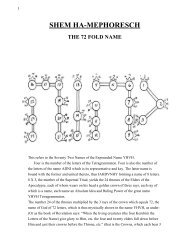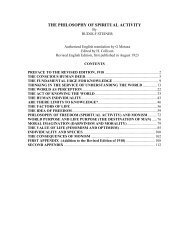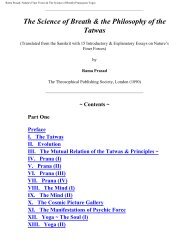Band 2 Anthropogenesis - H.P. Blavatsky
Band 2 Anthropogenesis - H.P. Blavatsky
Band 2 Anthropogenesis - H.P. Blavatsky
You also want an ePaper? Increase the reach of your titles
YUMPU automatically turns print PDFs into web optimized ePapers that Google loves.
founder of modern philosophy; the poet philosophers, Goethe, Krause, Schelling; and many astronomers, from Bode,<br />
Fergusson and Herschell to Lalande and Laplace, with their many disciples in more recent years.<br />
A brilliant list of honoured names indeed; but the facts of physical astronomy speak even more strongly in favour of the<br />
presence of life, even organised life, on other planets. Thus in four meteorites which fell respectively at Alais in France,<br />
the Cape of Good Hope, in Hungary, and again in France, there was found, on analysis, graphite, a form of carbon known<br />
to be invariably associated with organic life on this earth of ours. And that the presence of this carbon is not due to any<br />
action occurring within our atmosphere is shown by the fact that carbon has been found in the very centre of a meteorite;<br />
while in one which fell at Argueil, in the south of France, in 1857, there was found water and turf, the latter being always<br />
formed by the decomposition of vegetable substances.<br />
And further, examining the astronomical conditions of the other planets, it is easy to show that several are far better<br />
adapted for the development of life and intelligence -- even under the conditions with which men are acquainted -- than is<br />
our earth. For instance, on the planet Jupiter the seasons, instead of varying between wide limits as do ours, change by<br />
almost imperceptible degrees, and last twelve times<br />
------------------------------------------------------------------------<br />
[[Vol. 2, Page]] 707 WHAT FLAMMARION TELLS US.<br />
as long as ours. Owing to the inclination of its axis the seasons on Jupiter are due almost entirely to the eccentricity of its<br />
orbit, and hence change slowly and regularly. We shall be told, that no life is possible on Jupiter, as it is in an<br />
incandescent state. But not all astronomers agree with this. For instance what we say, is said by M. Flammarion: and he<br />
ought to know.<br />
On the other hand Venus would be less adapted for human life such as exists on earth, since its seasons are more<br />
extreme and its changes of temperature more sudden; though it is curious that the duration of the day is nearly the same<br />
on the four inner planets, Mercury, Venus, the Earth and Mars.<br />
On Mercury, the Sun's heat and light are seven times what they are on the Earth, and astronomy teaches that it is<br />
enveloped in a very dense atmosphere. And as we see that life appears more active on earth in proportion to the light<br />
and heat of the sun, it would seem more than probable that its intensity is far, far greater on Mercury than here.<br />
Venus, like Mercury, has a very dense atmosphere, as also has Mars and the snows which cover their poles, the clouds<br />
which hide their surface, the geographical configuration of their seas and continents, the variations of seasons and<br />
climates, are all closely analogous -- at least to the eye of the physical astronomer. But such facts and the considerations<br />
to which they give rise, have reference only to the possibility of the existence on these planets of human life as known on<br />
earth. That some forms of life such as we know are possible on these planets, has been long since abundantly<br />
demonstrated, and it seems perfectly useless to go into detailed questions of the physiology, etc., etc., of these<br />
hypothetical inhabitants, since after all the reader can arrive only at an imaginary extension of his familiar surroundings. It<br />
is better to rest content with the three conclusions which M. C. Flammarion, whom we have so largely quoted, formulates<br />
as rigorous and exact deductions from the known facts and laws of science.<br />
I. The various forces which were active in the beginning of evolution gave birth to a great variety of beings on the several<br />
worlds; both in the organic and inorganic kingdoms.<br />
II. The animated beings were constituted from the first according to forms and organisms in correlation with the<br />
physiological state of each inhabited globe.<br />
III. The humanities of other worlds differ from us, as much in their inner organization as in their external physical type.<br />
Finally the reader who may be disposed to question the validity of these conclusions as being opposed to the Bible, may<br />
be referred to an Appendix in M. Flammarion's work dealing in detail with this question; since in a work like the present it<br />
seems unnecessary to point out the<br />
------------------------------------------------------------------------<br />
[[Vol. 2, Page]] 708 THE SECRET DOCTRINE.<br />
logical absurdity of those churchmen, who deny the plurality of worlds on such grounds.<br />
In this connection we may well recall those days when the burning zeal of the Primitive Church opposed the doctrine of<br />
the earth's rotundity, on the ground that the nations at the Antipodes would be outside the pale of salvation; and again<br />
how long it took for a nascent science to break down the idea of a solid firmament, in whose grooves the stars moved for<br />
the special edification of terrestrial humanity.<br />
The theory of the earth's rotation was met by a like opposition -- even to the martyrdom of its discoverers -- because,<br />
besides depriving our orb of its dignified central position in space, this theory produced an appalling confusion of ideas as<br />
to the Ascension -- the terms "up" and "down" being proved to be merely relative, thus complicating not a little the<br />
question of the precise locality of heaven.*<br />
According to the best modern calculations, there are no less than 500,000,000 of stars of various magnitudes, within the<br />
range of the best telescopes. As to the distances between them, they are incalculable. Is, then, our microscopical Earth --<br />
a "grain of sand on an infinite sea-shore" -- the only centre of intelligent life? Our own Sun, itself 1,300 times larger than<br />
our planet, sinks into insignificance beside that giant Sun -- Sirius, -- and the latter in its turn is dwarfed by other<br />
luminaries in infinite Space. The self-centred conception of Jehovah as the special guardian of a small and obscure seminomadic<br />
tribe, is tolerable beside that which confines sentient existence to our microscopical globe. The primary reasons<br />
were without doubt: (1) Astronomical ignorance on the part of the early Christians, coupled with an exaggerated<br />
appreciation of man's own importance -- a crude form of selfishness; and (2) the dread that, if the hypothesis of millions of<br />
other inhabited globes was accepted, the crushing rejoinder would ensue -- "Was there then a Revelation to each world?"
















